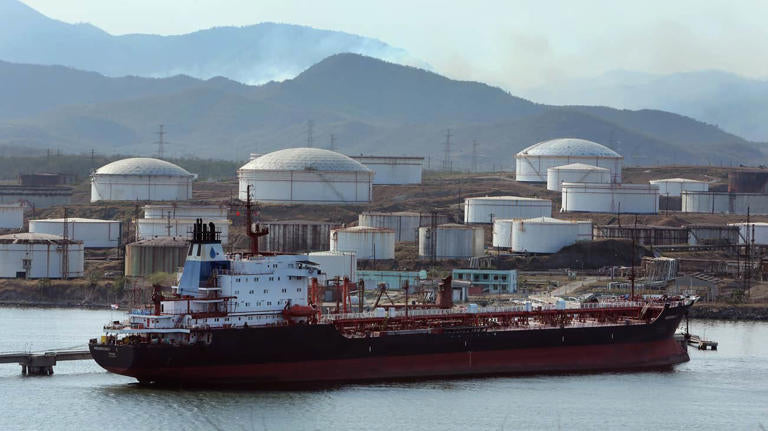
Russia’s Sakhalin Oil Stalls at Sea as Sanctions Choke Exports
Ashton RouthierShare
Russia’s Sakhalin Oil Struggles to Find Buyers as Sanctions Take Their Toll
The impact of global sanctions on Russian oil is becoming increasingly evident, particularly in the Far East, where unsold crude is piling up with nowhere to go. In Sakhalin, a key oil-producing region, the lack of available buyers and storage capacity is causing a bottleneck that could have significant consequences for Russia’s energy sector.
With sanctions limiting export opportunities, oil extracted from Sakhalin’s coastal fields is being stored on tankers that are now in short supply. As of mid-February, at least 6.3 million barrels of oil remain stuck offshore, equivalent to two full days of normal seaborne exports from all Russian ports. Meanwhile, total Russian oil exports have dropped sharply, with shipments falling by 25% in just one week and down 6% over the past month, reaching their lowest levels since early 2023.
A Market in Crisis
The situation is particularly dire for Sokol oil, one of Sakhalin’s key crude grades. Since new U.S. sanctions were imposed on January 10, eight shipments of Sokol oil have been loaded onto blacklisted tankers, yet only one has found a destination. Two tankers have transferred their cargo to a supertanker at the port of Nakhodka, but the rest remain stranded at sea, unable to unload. If these tankers do not clear their cargo soon, Sakhalin-1, one of Russia’s major oil projects, will run out of available vessels to transport new production.
A similar scenario is playing out at Sakhalin-2. Several tankers assigned to this project are now idling due to sanctions, and the Galactica tanker, which was meant to transport crude, is barely moving—crawling at just one knot near Japan’s Hokkaido island, seemingly in no rush to reach its destination in China.
As logistical headaches mount, Russian suppliers are being forced to slash prices in a desperate bid to attract buyers. Shipping costs have soared, and with the risks of handling sanctioned Russian crude rising, many buyers are reconsidering their involvement. The effect has been dramatic: the value of Russian oil exports dropped by $380 million in a single week, a 28% decline that underscores the financial strain on Moscow’s oil trade.
Despite these setbacks, Russian officials, including First Deputy Energy Minister Pavel Sorokin, insist that trade with key partners like India will continue. However, as sanctions tighten and logistical challenges worsen, Russia’s ability to maintain oil revenues is increasingly uncertain.
The STW Enviro Perspective: A Shift Towards Energy Stability and Sustainability
Russia’s growing struggles with oil exports reinforce a crucial lesson: reliance on volatile fossil fuel markets comes with significant risks. At STW Enviro, we see this as yet another signal that industries and nations must prioritize sustainable energy solutions to reduce exposure to geopolitical instability.
The challenges in Sakhalin highlight how oil transport remains a complex and risky business. With crude oil stranded at sea, the environmental risks of prolonged storage in tankers increase. Leaks, spills, and improper handling of crude could pose serious threats to marine ecosystems, making preparedness and rapid response more important than ever. Our Pristine Sea oil spill response technology is designed to mitigate the impact of such incidents, providing a crucial tool for minimizing damage when oil supply chains falter.
Beyond immediate risks, this crisis underscores the importance of long-term energy resilience. Countries that rely heavily on oil imports from geopolitically sensitive regions are increasingly vulnerable to price fluctuations and supply chain disruptions. Transitioning toward cleaner, more stable energy alternatives—such as renewables and advanced energy storage solutions—can help mitigate these risks while supporting environmental sustainability.
Conclusion
The bottleneck in Sakhalin is more than just a logistical issue—it is a symptom of deeper structural challenges in the global oil market. As Russia scrambles to find buyers and prices continue to drop, the long-term viability of its energy sector is in question. For industries and nations looking to the future, this crisis is a stark reminder of why energy diversification and sustainable alternatives must be prioritized.
At STW Enviro, we remain committed to promoting responsible energy solutions that reduce dependence on volatile fossil fuel markets and protect the environment from the risks associated with oil transport. The world is shifting, and those who embrace cleaner, more resilient energy strategies will be best positioned for long-term success.